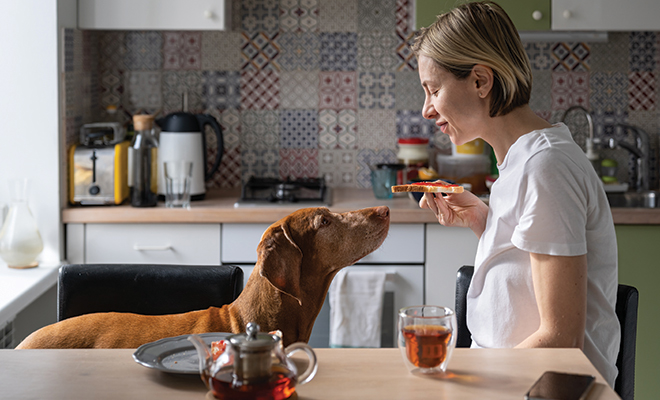
No, You Can’t Have This! Sorry!
He looks up at me while I’m finishing a salad with avocados. Or perhaps he smells the delicious fragrance of that brownie with ice cream. “Please!” he asks. Nope. You’ll be sorry and so will I, I reassure him.
It’s a responsibility I signed on to when my furry canine boy came home with me. It’s for his long-term health as well as the costs of veterinary visits. So we keep a mental list of what can’t go in his food bowl or slipped from a plate of leftovers. Many foods not harmful to humans can cause a serious health crisis when ingested by pets.
ALCOHOL
Dogs metabolize alcohol differently than humans, and ingredients such as xylitol, chocolate, coffee and spices commonly found in alcoholic beverages compound the danger. Symptoms of alcohol poisoning in animals, including dogs, are similar to symptoms in people, including vomiting, breathing problems, coma and in severe cases, death. Even small amounts of alcohol can lead to heart arrhythmias and dangerously low blood pressure.
AVOCADOS
Avocados contain persin, a fungicidal toxin. Small amounts are generally not a problem, but the high fat content can lead to health problems. Persin can cause vomiting and diarrhea and may also trigger fluid accumulation in the lungs and chest. This can lead to difficulty breathing and death from oxygen deprivation.
CANDY
Sugary and high-fat candy must be avoided. Treats containing xylitol or chocolate are particularly dangerous, potentially leading to serious health issues or even fatal outcomes.
CHOCOLATE
The presence of theobromine and caffeine makes chocolate toxic to dogs. The type and amount of chocolate ingested determine the severity of the reaction, ranging from mild to life-threatening. The Merck Veterinary Manual lists, from highest to lowest of the amount of toxic substances they contain, dry cocoa powder, unsweetened chocolate, cocoa bean hulls, semisweet chocolate, sweet dark chocolate and milk chocolate. White chocolate contains insignificant amounts of theobromine and caffeine.
COFFEE
If your dog ingests coffee grounds or any drink that is high in caffeine, it can be serious. Caffeine contains methylxanthines, which can cause potentially fatal diarrhea, vomiting, seizures, irregular heartbeats, tremors, arrhythmias, difficulty breathing and other symptoms. An overdose of caffeine can causing rapid or irregular heartbeats leading to hospitalization or death.
DAIRY PRODUCTS
Lactose intolerance makes dairy products a source of food intolerance. While small amounts may be tolerable for some dogs, why take the risk? A little bit of cheese is okay, but too much can lead to weight gain.
FATTY FOODS
Pancreatitis can be the result of a diet high in fat and rich foods. A surge of cases usually occurs around holidays such as Thanksgiving. So, keep that turkey skin away from your pet!
Turkey bones and cooked bones of any kind should be avoided, too. Bone shards can be sharp and cause damage to the mucosal walls of the stomach and intestines, possibly perforating the lining of these organs and causing a life-threatening abdominal infection.
GARLIC, ONIONS, LEEKS, CHIVES
Members of the Allium family contain compounds such as n-propyl disulfides and thiosulfates, which can damage a dog’s red blood cells, leading to poisoning and potential fatality. Onion and garlic powders can be found in many foods, so read labels and avoid feeding your dog products that contain them.
GRAPES.
Small amounts of grapes or grape products can induce kidney failure in dogs. Avoid grape-related products, including raisins and juice.
NUTS
Peanuts are safe in moderation; others, such as macadamia nuts, can cause vomiting, tremors and increased body temperature. The American Kennel Club emphasizes that all nuts pose a choking hazard and can contribute to weight gain and pancreatic issues.
RAW BREAD DOUGH
Uncooked yeasted dough can ferment in a dog’s stomach, leading to alcohol poisoning and aspiration. Immediate veterinary attention is required to address these potentially life-threatening complications.
STONE FRUITS
While fruits such as peaches and nectarines aren’t toxic, their pits present a choking hazard and contain a compound that turns into cyanide when digested. Opting for safer fruits like apples, bananas and blueberries is advisable.
TEA
Tea contains caffeine, which can raise a dog’s blood pressure and cause heart arrhythmias and seizures. Again, it’s necessary to keep dogs from caffeinated beverages.
XYLITOL
The sugar substitute xylitol, found in various sugar-free products, can lead to a rapid and life-threatening release of insulin in dogs that can lead to liver failure. Avoid items such as gum, mints, desserts, purchased baked goods, vitamins, cough syrup and toothpaste that may contain xylitol. Dog poisoning cases involving xylitol are increasing; the xylitol in five pieces of sugar-free gum can kill a 65-pound dog.
If you suspect your dog has ingested any of these substances, prompt action is crucial. Contact your local vet, an emergency clinic or the ASPCA’s Animal Poison Control Center at 888-426-4435 for timely guidance to mitigate potential health complications or fatalities.
Sources: everydaycheapskate.com, petsbest.com and merckvetmanual.com.







